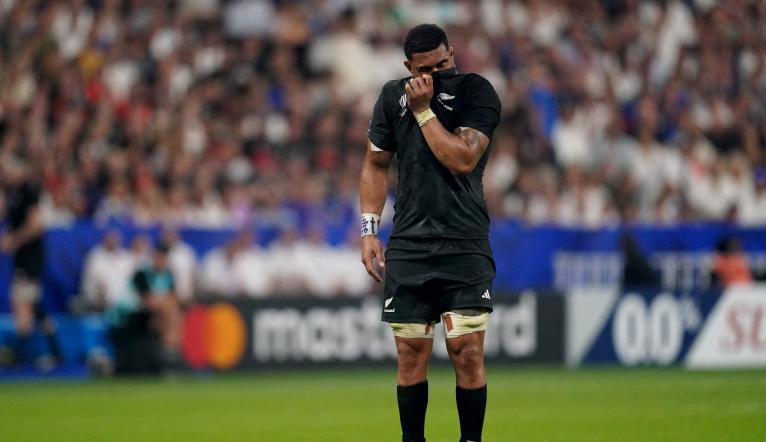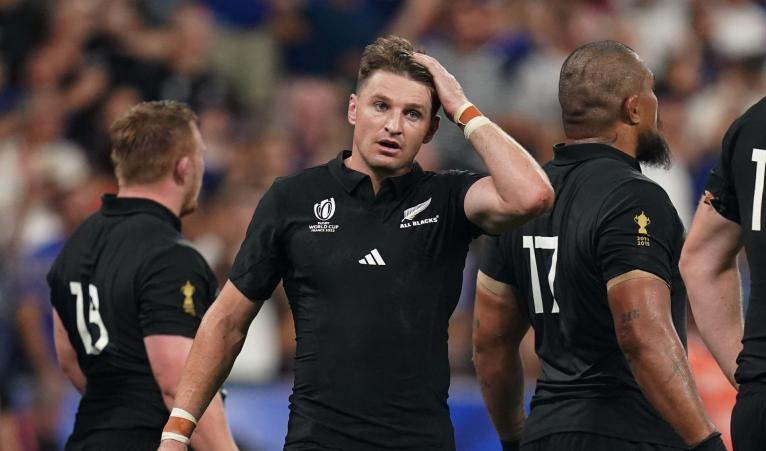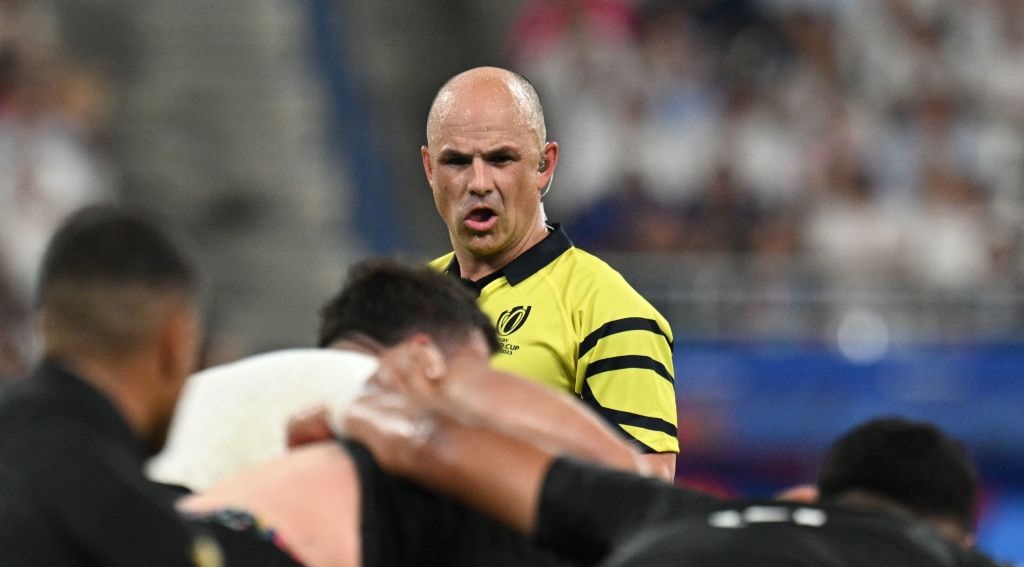Ref Watch: A touchy subject

From a shortlist of two it was experienced South African whistler Jaco Peyper rather than sole France 2007 survivor Wayne Barnes who – depending on your view – was given the honour or drew the short straw to get the 2023 World Cup underway.
With the eyes of the rugby-watching world on this seismic encounter between France and New Zealand at the Stade de France, World Rugby can be forgiven for the most risk-averse opening night refereeing selection possible and Peyper rewarded their faith with a solid display.
I couldn’t help but wonder if England’s players were watching as two of the world’s leading four sides went through 80 minutes without a hint of a high tackle – perhaps it isn’t as hard as it seems Owen?
The competition needed an opening night free from controversy when the players made the headlines – and it got it. With one game down and 47 to go Peyper and his team set benchmarks in certain key areas – let’s hope those who follow adopt the same standards.
TMO Relationship
I was massively impressed by the refined approach which saw a lot less time spent analysing slo-mo replays and the referee encouraged to back his onfield judgement.
At the same time it was also clear that English TMO Tom Foley had Peyper’s back. For instance, in the 12th minute Peyper and TJ Christophe Ridley were preparing for a lineout when the ref suddenly without warning marched infield and awarded France a penalty for the New Zealand kick chase making contact in the air prior to the ball going into touch. This call clearly came from Foley.
Similarly, the collision that followed Peato Mauvaka’s chip-and-chase drew huge amounts of whistles from the home crowd and it was apparent from Peyper’s slight hesitation that he was taking advice from his TMO behind the scenes before restarting play with a goal-line drop out.
There was also a nice display of teamwork between the officials early in the second quarter. Following a period of advantage Foley quietly moved Peyper ten metres infield towards the home posts to ensure the original mark was awarded at the correct point – from where New Zealand had a simple kick at goal.
The speed of Foley’s input to rule out a possible Damian Penaud try early in the second half was especially taking – two replays and a decision which came before the players had time to draw breath.
It seemed there was a shift back to the referee being the primary decision maker and the TMO being a reference point unless there was a glaring mistake which required intervention.

Cynics may suggest the lack of TV replays from a French director who seemingly preferred arty shots of the crowd to the rugby helped in this respect since the social media soapbox mob were left without ammunition.
But either way it certainly improved the flow of the game and enhanced the spectacle without opening the door for any major officiating mishaps. For me Ben Kay summarised it well in commentary: “The referee backed his onfield judgement which is exactly what we want to see.”
Scrum Penalties
The overall penalty count finished 4-12 in France’s favour with les Bleus only being pinged once in the whole second half.
New Zealand prop Ethan de Groot was twice singled out by Peyper in the scrum with both penalties being good examples of how referees think.
Contrary to what some would have you believe refereeing the scrum isn’t all guesswork (usually!) and the officials use available visual clues to work out which prop is more under pressure.
In de Groot’s case his leg position was the ‘tell’ since to withstand the weight being (legally) brought to bear by the enormous Uini Atonio he had them fully straightened behind him. New Zealand’s loose head was therefore left badly unbalanced and quickly went to ground when the French tight head cleverly shifted his body position.

Back to the Future
Was I alone in doing a double take when French no.8 Gregory Alldritt was called back for being in front of his team’s restart in the second quarter?
If Mr Peyper had gone on to award a free kick for scrum feeding we would all have needed to check if we were watching a rerun of the 1987 final between the same teams rather than the 2023 version.
Joking apart, with restarts now treated by coaches as a third set-piece, this crackdown – if indeed that was what we witnessed the opening stanza of – is a logical and welcome development. Watch this space…
When forwards is backwards
Freeze the picture at the instant that Anton Lienert-Brown throws a long pass in the direction of Mark Telea in the build-up to New Zealand’s second try and you will note that Peyper, the Kiwi no.12 and touch judge Christophe Ridley are positioned in a perfectly straight line.
There was therefore no way that the officials could miss a forward pass – and according to all the subsequent TV analysis (which included Maggie Alphonsi praising the play) their decision not to recall Telea’s touchdown was a correct one.
However, let your TV run a few frames forward and look where the ball lands – perhaps five metres in front of where it was thrown from.
Under the forward pass interpretation which introduced nuance around the direction in which the hands travel this is very probably not considered a forward pass.
But to a simple soul like me – and I suspect millions of occasional rugby fans watching on terrestrial TV – since it certainly didn’t go backwards what else can it be?
In the bunker
We had our first World Cup look at the bunker system in operation when Peyper despatched Will Jordan to the sidelines following a mistimed aerial challenge with the cross-arms signal that triggers a bunker TMO look at whether the incident merited a red rather than yellow card.
It took around three minutes for confirmation to arrive that due to the catcher landing on his side the degree of danger was low and ten minutes in the sinbin was therefore an appropriate sanction.
In summary another good development which speeds up the game – albeit we will all need to accept the inevitable (but in my view entirely acceptable) consequence that a straight red card will almost never now be shown.
Anorak corner
Full marks to the excellent Miles Harrison for his word-perfect description of the 71st minute incident that saw Thomas Ramos call a mark then take play inside the New Zealand 22 with a fine kick that landed flush on the touchline and therefore went directly into touch.
TJ Christophe Ridley was almost fooled and started to head back to the point where Ramos kicked the ball before realising (perhaps with Foley’s assistance) that since the mark was inside the French 22, the gain in territory should stand.
But it was dear old Miles who won the anorak-of-the-day award by then pointing out that in case any viewer was wondering a 50/22 cannot be awarded from a free kick – only from a kick made in open play.
Only you were wondering that, Miles!
Touch Judge Lesson Number One
When you start refereeing at your local society inevitably within a few months you get appointed to run touch for someone with a bit more experience, perhaps at a cup tie or at a midweek evening game.
Working with someone that has a few years under his or her belt is a great way to learn – and pre-match you are always briefed by the ref with a very short list of touch judging do’s and don’ts.
Top of the pile – without fail – is that you under no circumstances ever raise your flag behind the posts without first conferring with your fellow touch judge. Unless you both agree with a big nod of the head both flags stay down and the referee makes his/her own decision since anything else creates a possible flashpoint and looks awful.
Of course, if one of your touch judges was fast-tracked from being a professional player straight to the English Premiership he probably never spent the time learning this basic lesson while running the line at a junior club on a cold Sunday afternoon in November.
Since France were out of sight Karl Dickson’s faux pas following their second try was hardly noticed but imagine if it had been 15-all and a kick to win the game?
























































Refs tend to be very picky about throwing straight at lineouts. How about checking for illegal throws.I n the (good) old days wingers would keep their feet behind the line, but the feet of hookers started creeping forward more and more.(No names mentioned). In the last England Wales game when England scored from the lineout the England hooker was standing with his heels on touchline but on tiptoe in the field of play when the ball was released. The England try should have been ruled out for illegal throw. The Video Refs should check the throw in in the same way football VAR checks the position of the goalie's feet if a soccer penalty is saved
What is the ruling now. The rules appear to say both feet must be outside the field of play when the ball is released. If only the heels are on the touchline is it an illegal throw?
Good analysis but please stop questioning the forward pass interpretation.
A ball thrown by a player running at speed will always go forward relative to the ground, because the speed of the fastest passes is very close to the speed of a player running. The fastest players run at around 11 m/s; the fastest passes are around 10.9 m/s.
Given that, the only way to make it travel backwards relative to the ground is to throw it almost directly backwards with full force - which is impossible to do while running in the opposite direction
The “backwards from the hands” rule is basically the only sensible way to ref the pass, at least until the smart ball tech trialled at the JRWC makes it into the senior game.
In truth, all passes are forward, but only a few - usually those that are close to a visible line on the pitch - look forward enough that it looks obvious.
The refs are typically getting it right these days - as your analysis shows - and I think it’s more important to explain how the decisions work than to question them from a point of naïveté.
There's no question that France played well. Had NZ not scored within 90 odd seconds it's obvious to anybody that follows rugby that the game would have been different. It's high time that WR prohibit biased, incompetent officials from the game at all levels. Pyper has been the laughing stock of WR officials for years now. Time to move on.
I love putting the on-field referee firmly in charge, and I love this article. Some of this I noticed, some I didn't really grasp in the heat of the moment. Please write more like this, which make me look back at moments of the game with more understanding...and a bit of humor!
I like the keeping the flow going. With minimal intervention and minimal tmo.
However I thought peypper's laisser faire at the break down with a lot of diving allowed was ridiculous.
Also that pass was forward with or without momentum (passer not running fast and was running sideways).
Sounds like you can send forward now if your hands looks backwards? That makes no sense.
Finally looked like there was a forward on the turnover on the last French try. TMO should have checked.
But TMO should have checked the previous denied french try. There wasn't a lot of angles shown but on the one they showed it seems like penaud didn't touch it. The fact that peypper didn't even let the action finish was very strange
I'm glad the game wasn't close and it wasn't a final because that's a lot that would have affected the outcome of the game.
Peyper was very good and very clinical, the Kiwis did not back themselves at all and sadly no refereeing decisions could have saved them. Tough day in the office
Did nobody else see the knock on on the ground before the chip kick that led to the second French try - the French player was on the ground and knock ball forward and regathered
While I would say Peyper had a good game - he pinged the ABs on occasions which were dubious - Talea was trying to get the ball of Aldritt who was hanging onto the ball on the ground then Whitelock gets pinged and not DuPont - Newell got pinged for not rolling away but he did and the DuPont had clear access to the ball